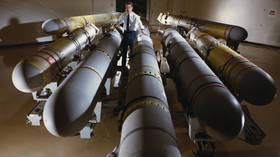Trump signs anti-doping ‘Rodchenkov Act’ despite WADA saying it could ‘jeopardize’ partnership & harm whistleblowers
President Trump has signed a law aimed at prosecuting doping offenders at international sporting events. The legislation was earlier criticized by the Word Anti-Doping Agency (WADA).
The new law allows the US to impose criminal sanctions on people engaging in doping at international events, which involve American athletes, sponsors or broadcasters. The legislation empowers officials to seek fines of up to $1 million and jail terms of up to 10 years, as well as restitution to victims.
The law is named after Grigory Rodchenkov, the former chief of Russia's main doping control laboratory in Moscow. He alleged that there was a widespread state-run secret campaign to supply athletes with doping and hide their test results from international inspectors. Russia denied that there ever was such a state-sponsored campaign.
Rodchenkov fled to the US in 2016 and was later charged by Russian officials with running an illegal doping scheme.
Russian sports minister Oleg Matystin said that he shares the opinion of the global sports community, including WADA, that the Rodchenkov Act could lead to “an imbalance in the system of doping control and prevention.”
“It would mean that one country takes upon itself the right to be a judge. We view this negatively,” Matystin said on a Russian sports TV channel. “In the nearest future, we have to think how to minimize the risks for Russian athletes.”
WADA expressed similar concerns last month when the Rodchenkov Act had passed the US Senate.
“No nation has ever before asserted criminal jurisdiction over doping offences that occurred outside its national borders – and for good reason,” the global doping control body said in a statement.
Also on rt.com ‘If it’s not good enough for the US, why is it fine for the rest of the world?’ WADA slams controversial Rodchenkov billWADA argued that “by unilaterally exerting US criminal jurisdiction over all global doping activity, the Act will likely undermine clean sport by jeopardizing critical partnerships and cooperation between nations.” The organization also said the proposed legislation could potentially harm future whistleblowers.
Rodchenkov’s allegations were used to bar Russian athletes from several major international sporting events.
In 2017, the International Olympic Committee (IOC) suspended the Russian Olympic Committee. The decision forced Russians to participate in the Winter Olympics held in South Korea as individual athletes competing under the neutral Olympic flag. The Russian Olympic Committee was later reinstated by the IOC in 2018.
Also on rt.com Cheating just because she’s winning? Russian ski official reacts furiously to ‘idiot’ journalist after suggestions of dopingThink your friends would be interested? Share this story!












